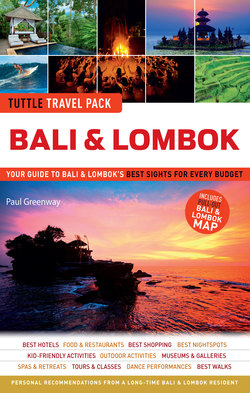Читать книгу Bali & Lombok Tuttle Travel Pack - Paul Greenway - Страница 6
На сайте Литреса книга снята с продажи.
ОглавлениеPARADISE BECKONS
Bali is many things to many people. To some, the attractions are the sun, sea and shopping, and the never-ending search for The Happiest Hour. Many admire the variety of landscapes while hiking around volcanoes, whirling across lakes on speedboats, and rafting down rivers. And others prefer Bali’s cultural riches, seeking spiritual enlightenment from visiting temples and attending yoga retreats. In fact, it’s possible to attend a majestic Hindu ceremony at a 1,000-year-old temple in eastern Bali in the morning, walk around a volcanic lake during the afternoon, watch the dripping sunset at Tanah Lot and finish up at a Seminyak nightclub as trendy as anything in Europe. But Bali is somewhere to dawdle, not run; a place to linger and relish its distinctive sights, sounds, and tastes.
The unique, ancient culture and religion that dominates every aspect of Balinese life remarkably somehow survives and even co-exists with the malls, resorts, and nightclubs that tourism and modernism has brought. Unshakeable values regarding family and village ensure that faith, traditions, and rituals have rarely changed for centuries, yet allow for inevitable modern intrusions. The Balinese are blessed and they know it, as they constantly give thanks to the gods for the climate and topography that allow them to be self-sufficient, while relishing a life on one of the most glorious places on earth.
The Balinese have always resisted intrusion and repelled invasion, whether from Islam during the 16th century or interference by Jakarta since independence; even many of the Dutch colonialists could see the benefits of preserving rather than destroying Balinese culture. But rampant development continues and is now more relentless than ever as tourists—foreign and Indonesian—arrive with insatiable needs from finite resources. As more rice fields disappear to build bungalows for foreigners, Bali may soon reach its zenith; maybe, it already has become a “Paradise Lost.” But the pessimists have been saying that ever since the 1930s, when an average of three westerners arrived per day.
Although nearby, and with a similar landscape of rice fields, volcanoes, and surfing beaches, Lombok is vastly different in numerous ways, most notably because the dominant religion is Islam, not Hinduism, and the indigenous people are Sasak. Consequently, ceremonies are infrequent and traditions and cultures less obvious, but the people are also warm and inviting. Tourism flourishes at Senggigi, the Gili Islands, and Kuta beach to the south, but not (yet) in the unabated and unabashed ways found on Bali. Yet, ironically, more and more tourists are finding out that a primary attraction of Lombok is the lack of other tourists.
